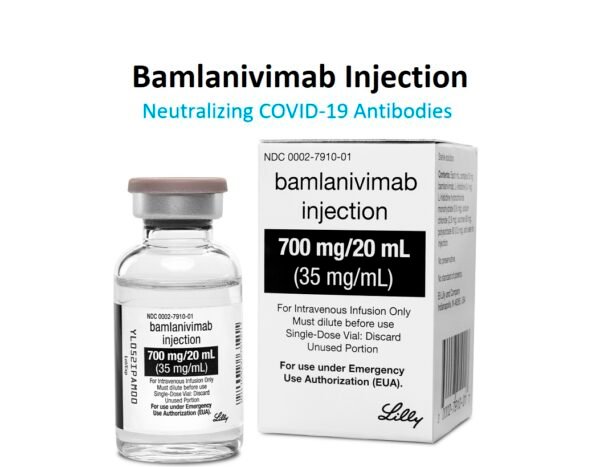A recombinant, neutralizing human IgG1 monoclonal antibody called bamlanivimab is aimed to target the spike protein of the SARS-CoV-2 virus. These antibodies inhibit the entry of the virus into human cells by blocking the viral attachment to the cell surface receptors.
Bemlanivimab is thus only helpful in patients who are in the viremic phase. It might also aid in preventing COVID-19 recurrence (It is being investigated to see if it can prevent COVID-19 in long-term care facility residents and employees.).
The use of bamlanivimab for the treatment of adults and kids 12 years of age or older who were first tested for SARS-CoV-2 infection is authorised by the emergency use authorization (EUA) statute.
Patients who are at risk of acquiring severe COVID-19 infection and need hospitalisation but only have a mild to moderate COVID-19 infection may be treated. [Ref].
Who should not receive Bamlanivimab?
The use of bamlanivimab in the following patient populations is not permitted:
- Hospitalized patients with COVID-19 infection
- Patients who require a more elevated oxygen flow rate if they are taking oxygen for a chronic lung illness irrelevant to COVID.
- Patients who need supplemental oxygen
Patients who are hospitalized, those requiring oxygen, and patients on mechanical ventilation may get worse if they receive treatment with Bamlanivimab.
Bamlanivimab Dose and Administration:
It is administered as a single dose infusion of 700 mg. Within ten days after the onset of symptoms and as early as feasible following a COVID-19 confirmation test.
Important Safety Information:
Like all other immune therapies, it is associated with serious infusion-related adverse events. Patients may develop hypersensitivity reactions manifesting as:
- Fever and chills
- Sickness
- Headache
- Bronchospasm
- Low blood pressure
- Dizziness
- Throat itch
- Angioedema
- Inflammation including urticaria
- Pruritus
- Myalgia
Severe reactions manifesting as anaphylaxis may occur during the infusion. Patients who develop serious adverse reactions must immediately stop the infusion. Patients should be managed appropriately. Other side effects, compared to placebo, observed in clinical trials include:
- Pruritus (2% - 1%) and
- Nausea (3% - 4%),
- Vomiting (1% - 3%).
- Headache (3% - 2%),
- Diarrhea (1% - 5%),
- Dizziness (3% - 2%),
The drug has not been studied in pregnant and breastfeeding women.
In Conclusion:
For outpatient settings, under EUA, the use of bamlanivimab therapy is suggested for treating COVID-19. It prevents viral entry into cells and may be helpful in the deterence of COVID-19 condition in individuals at risk. Until the COVID vaccine is available, it may help reduce the disease burden. Let's hope!







